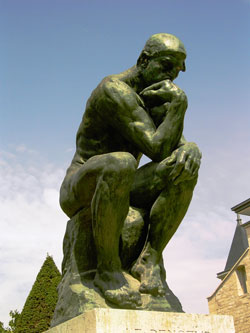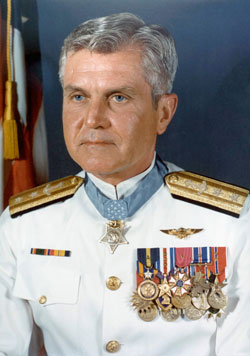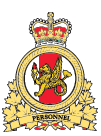 This information has been archived for reference or research purposes.
This information has been archived for reference or research purposes.
Archived Content
Information identified as archived on the Web is for reference, research or recordkeeping purposes. It has not been altered or updated after the date of archiving. Web pages that are archived on the Web are not subject to the Government of Canada Web Standards. As per the Communications Policy of the Government of Canada, you can request alternate formats on the "Contact Us" page.
Views and Opinions

Andrew Horne via Wikipedia.
The Thinker, by Auguste Rodin.
Philosophy and the Military
by Manon Turgeon
For more information on accessing this file, please visit our help page.
Introduction
Every day, Canadian military personnel working within or outside Canada are confronted with dilemmas that force them to make difficult decisions. They must, among other things, analyze the orders they receive to ensure that they comply with Canadian laws and values. In order to do this, the men and women of the Canadian Forces (CF) must be able to exercise judgment and to justify their decisions. These obligations constitute, in part, what Canada requires and expects of its warriors.
It is false to believe that the Canada’s military members must obey without thinking. On the contrary, reflection, along with the ability to analyze and to evaluate, often under stressful and urgent circumstances, forms an integral part of the responsibilities of members of the armed forces.
Learning to Think
Because lack of understanding is often the source of intolerance, prejudices, and hatred, philosophical reflection is vital for all CF members. In fact, the study of philosophy can promote tolerance, the search for objectivity, and impartiality. But more importantly, philosophy opposes pure and simple indoctrination; therefore, it enables Canadian military personnel to pledge allegiance to, and to defend, Canadian values in a voluntary and reflective manner.
The study of philosophy is the best way to develop the faculty of judgment. Furthermore, philosophy contributes to the development of the critical mind all Canadian military members need in order to evaluate the behaviours and social systems with which they are confronted. Military personnel regularly question the information they receive, for their own lives, and those of others, depend upon that reflection. The 21st Century soldier often has a high level of education and knows how to evaluate strengths and weaknesses in reasoning. Philosophical education, in that context, is an essential prerequisite to modern soldiering.
The objectivity of judgement is crucial, because it is unacceptable for a military professional to make a decision based upon personal interests or preferences, which may include, but are not limited to, issues of religion, gender, or sexual identity. By the same reasoning, one cannot, in this day and age, forbid a member of the CF to execute a certain task, based upon his or her own sexual orientation or gender. Military personnel, just like other Canadian citizens, cannot let their personal interests guide their actions. And an education in philosophy helps the military understand this principle.
Military and Moral
The individuals who become members of the CF (at least, the majority of them) do so in order to defend Canadian principles and values, such as the fundamental right to education, health, freedom, and life.
In a letter to her brother who is opposed to her deployment in Afghanistan, Catherine Déri,1 a Canadian Forces logistics officer, depicts in clear terms this commitment when she tells her brother that she respects the passion he demonstrates for his convictions. She encourages him to use his freedom of speech to communicate these principles, underlining the fact that this act of democracy is a cherished value for the Canadian population, a fundamental liberty that one wishes for all individuals living in the countries where members of the CF are deployed. Déri notes that we all want to make a difference, each in our own way, and that in the end, both she and her brother desire world peace.
Thus, philosophy can help develop an allegiance (rationally justified) to the Canadian Forces’ principles and obligations, as well as to justice as we understand it in Canada. When understood in this way, philosophy is, in fact, the theoretical formulation of methods that allow individuals to reflect in the fairest and most impartial way. It is also understood as the vehicle of ideals and values that we want to promote in our society.
As a matter of fact, moral responsibilities imposed by the Statement of Defence Ethics require a capacity to analyze and to judge rationally a condition that can be promoted by philosophical reflection. The Statement of Defence Ethics iterates the fundamental obligations and principles that guide all individuals working for the CF and for the Department of National Defence (DND):
Statement of Defence Ethics2
The CF and the DND have a special responsibility for the defence of Canada. This responsibility is fulfilled through a commitment by the Department and its employees, and the CF and its members, to the following ethical principles and obligations:
Principles
- Respect the dignity of all persons;
- Serve Canada before self; and
- Obey and support lawful authority.
Obligations
- Integrity;
- Loyalty;
- Courage;
- Honesty;
- Fairness; and
- Responsibility.
This statement is part of a long tradition that goes back to those philosophizing upon Virtue, such as Socrates, or upon Justice, such as John Rawls, and this includes those who elaborated upon the principles of Just War theory. Interpreted in the light of that tradition, the Statement of Ethics represents, on its own, an invaluable guide to reflection.
From a larger perspective, one could illustrate the importance of philosophy for military life by using a convincing example from The World of Epictetus: Reflections on Survival and Leadership. In this article, American Congressional Medal of Honour winner Vice-Admiral James Bond Stockdale provides a testimony concerning his experience when flying on operations, in 1965, over Hanoi in North Vietnam. He was, at the time, a pilot and Commander of Air Wing 16 flying off the carrier USS Oriskany when his aircraft crashed after being hit by enemy fire. He was subsequently captured and imprisoned for the next seven-and-a-half years. In his article, the admiral explains the importance of personal integrity for survival under imprisonment, isolation, and constant torture. Attributing his own survival to his classical education as well as to his understanding of history, the Book of Job, and Epictetus’ stoic philosophy, he believes that one must be provided with an education that will help individuals avoid moral weakness that inevitably leads to personal ruin:
Education should illuminate values, not bury them amongst the trivia. . . . Integrity is one of those words which many people keep in that desk drawer labelled “too hard”. It’s not a topic for the dinner table or the cocktail party. You can’t buy or sell it. When supported with education, a person’s integrity can give him something to rely on when his perspective seems to blur, when rules and principles seem to waver, and when he’s faced with hard choices of right or wrong. It’s something to keep him on the right track, something to keep him afloat when he’s drowning; if only for practical reasons, it is an attribute that should be kept at the very top of a young person’s consciousness. 3
Stockdale’s story emphasizes the importance for everyone to understand moral philosophy. The message is fundamental when it comes to understanding how philosophy can influence and assist military members in accomplishing their tasks, while still being able to maintain their integrity within the terms of a given mission.

U.S. Navy photo 050706-N-0000X-005.
Rear-Admiral (later Vice-Admiral) James B. Stockdale.
Conclusion
Stockdale’s testimony demonstrates the importance of teaching philosophy, not only for the Canadian military, but also for any individual seeking the means and tools to live better. Charles Oliviero,4 a retired Canadian colonel and a highly experienced combat arms officer, in an article published in the Canadian Military Journal in the spring of 2005, deplores the fact that philosophy does not have a more important place in the Canadian Forces. Oliviero believes that, in order for our future leaders to meet the requirements and responsibilities that will be demanded of them, they must have the necessary tools—tools that teaching and understanding philosophy can provide.
There is hope for a happy marriage between philosophy and the CF, because the common-core program for students of the Royal Military College Saint-Jean includes three mandatory philosophy courses. Also, the Royal Military College of Canada in Kingston offers other philosophy courses dedicated to political ideas, as well as a psychology course, Leadership and Ethics, in which a large portion is devoted to philosophical ethics.
![]()
Manon Turgeon has been teaching philosophy at the Royal Military College St-Jean since 2001. She completed her Masters’ degree in political ethics at the University of Quebec in Montréal.
Notes
- D. Boucher, M. Imbeault, J.P. Lepage, O. Moya, J. Paquin, M. Provencher, S. Rochon, Réponse à mon frère qui s’oppose à mon déploiement en Afghanistan, in Philosophie 3, Éthique et Politique (Québec, Beauchemin, 2008), p. 293.
- Defence Ethics Program, Canada, National Defence, [On line], 2007, at
www.forces.gc.ca/ethics/index_e.asp. - J.B. Stockdale, “The World of Epictetus: Reflections on Survival and Leadership,” in Mlaham M. Wakin (ed.), War, Morality, and the Military Profession, 2nd Edition, (Boulder, CO: Westview Press, N/D), p. 12.
- C. Oliviero, “Put away that calculator and pick up a book,” in the Canadian Military Journal, Vol. 6, No. 1, Spring 2005, at
www.Journal.forces.ca/engraph/vol6/no1/PDF/13-ViewsOpinions2_e.pdf.






